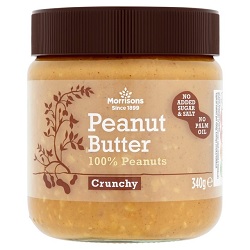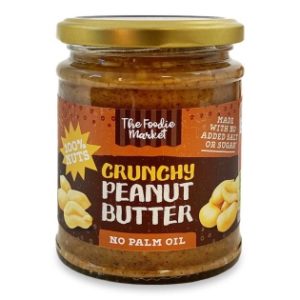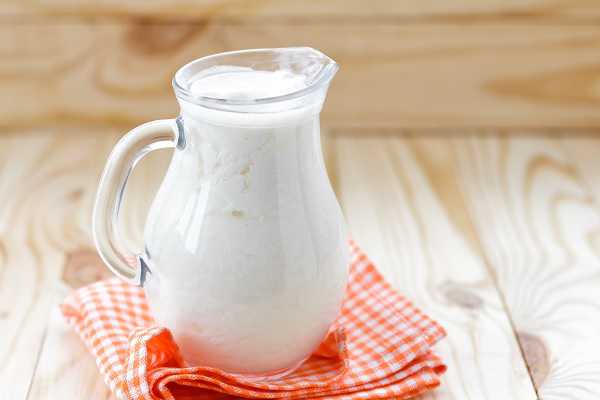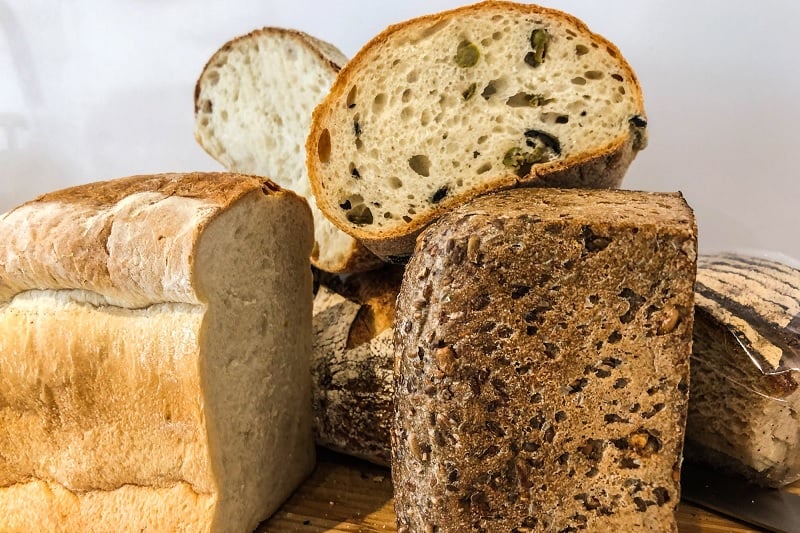As with lots of foods, everyone seems to have a different opinion about whether or not peanut butter is healthy and why.
One thing that everyone agrees on though is that some peanut butters are healthier than others, in particular those with the lowest sugar, vegetable oil, and salt content.
Table of Contents
Is Peanut Butter Healthy?
Peanut butter can be healthy in a moderate amount. Here’s an overview of its health benefits and potential negative effects.
Health Benefits
Peanuts can help to keep your heart healthy and can possibly even stave off chronic diseases in those who consume an average of 10 grams per day (source).
Peanuts are a good way to fulfill your dietary requirements, as they contain:
- Protein
- Fibre
- Antioxidants (mainly found in the skins)
- Minerals
- Monounsaturated and polyunsaturated fats
This doesn’t mean you should grab a packet of salted peanuts or that jar of peanut butter and polish it off, as peanuts are healthiest when consumed in their natural state.
Many peanut butters add in vegetable fats and extra salt, which can take away from the healthy elements of the nuts, but more recently, more health-conscious brands have been competing to create the healthiest peanut butter on the market.
When you buy a regular jar of peanut butter, there are a few ingredients to look out for which might make your choice of peanut butter less healthy than you might think.
Frequent additions to peanut butter can include:
- Vegetable oil
- Palm oil (which is also often produced in an unsustainable way)
- Salt
- Sugar
- Honey
Potentially Harmful Effects
Peanut butter is generally considered to be healthy in moderate amounts, but there are some potentially harmful effects of eating too much.
- Too much omega 6 – Most people in the UK consume too much omega 6 and not enough omega 3.
An omega 6 to omega 3 ratio of 4:1 is recommended, but for most people in the Western world, this ratio is at least 12:1.
Peanuts contain virtually no omega 3 and have about 5,000 times as much omega 6 as omega 3, so they’re not good for your overall omega 3 to 6 balance.
If you eat a lot of peanut butter, it might be a good idea to also take an omega 3 supplement or up your intake of omega 3-rich fish such as sardines and mackerel. - Mould and fungus growth – Peanuts are grown on the ground where they can get moist and acquire mould and fungus. This is linked to allergies, and some moulds found in peanuts can even be a carcinogen.
- Oxalates – Peanut butter is high in oxalates, which can cause kidney stones.
How to Choose a Healthy Peanut Butter
Choosing healthy peanut butter is quite straightforward. Look for the following things:
- High peanut content –The healthiest peanut butters are made from 100% peanuts, with no added preservatives, salt, or sugar.
- No added sugar – Peanuts naturally contain small amounts of sugar (about 3 g per 100 g). Added sugar increases the calorie content.
- Free of vegetable oil
- Low in salt
List of the Healthiest Peanut Butter Brands
Here’s a list of the healthiest peanut butter brands we could find on the market in the UK. We looked for brands that met our criteria of having high peanut content, no added sugar or vegetable oil, and being low in salt.
Some people find these peanut butters to be dry or bland in taste. They can take some getting used to if you’re accustomed to sweet peanut butter packed with added sugar.
1. Funky Nut Natural Smooth Peanut Butter
Price range: £
Ingredients: Hi-Oleic roasted peanuts
Peanut content: 100%
Calories per 100g: 628 kcal
Funky Nut is a small brand that makes Hi-Oleic peanut butter which comes in both crunchy and smooth varieties.
High-oleic peanuts are peanuts that contain 30% more mono-unsaturated fat (the good fat) than normal peanuts. This means they can help to lower cholesterol and can be put in the same arena as avocados and olive oil, for maintaining good heart health.
In fact, a study found 60g of high-oleic peanut butter per day to increase weight only minimally, despite the high increase in calories.
This is the only Hi-Oleic peanut butter on this list that does not contain any salt. This PB contains flavonoids and antioxidants and can also be used as a cooking ingredient.
Pros:
- 100% Hi-Oleic roasted peanuts
- No palm oil
- No added salts or sugars
- Made in the UK
- Cheap to buy
Cons:
- Low quality packaging
- Can taste bland (due to no added salt)
The packaging quality of this peanut butter may be a bit substandard and people have reported receiving the product with a broken seal.
2. The Protein Works Peanut Butter
Price range: £££
Ingredients: Roasted peanuts
Peanut content: 100%
Calories per 100g: 564 kcal
The Protein Works Peanut Butter is one of the only smooth butter on this list and is another peanut butter without palm oil.
This is the priciest PB in our line-up and their crunchy version is even more expensive.
With just peanuts making up 100% of its recipe, it does leave you wondering how they can charge more for the same ingredients as the other products on the market.
Pros:
- Made with 100% roasted peanuts
- Produced in the UK
- Great natural taste
Cons:
- Relatively expensive (priciest on the list)
- Packaging can be tough to open and close
Similar to the Bulk Powders brand, this product is sold as a protein product that can be used to help bulk up and add healthy calories to a diet, so may appeal to gym-lovers or bodybuilders.
When it comes to the product as food, there are plenty of positive reviews which state how wholesome this PB tastes.
3. Bulk Powders Natural Roasted Crunchy Peanut Butter
Price Range: £
Ingredients: Roasted peanuts
Peanut content: 100%
Calories per 100g: 564 kcal
Bulk Powders Natural Roasted Peanut Butter contains only 100% roasted whole peanuts, so it’s one of the peanut butter brands without palm oil on our list.
It is pretty cheap to buy, which may be reflected in the quality of the packaging. Some people have also complained that the plastic container shattered as they took the lid off.
The nut and butter, may naturally separate after some time, just give it a stir. They also have a smooth peanut butter variant.
Pros:
- Made from 100% roasted peanuts
- Cheap to buy
- Contains no shugar, salt or preservatives
- No palm oil
Cons:
- Not as crunchy as some other “crunchy” peanut butters
- Container plastic can be brittle
- Some may find it a little powdery
Bulk Powders is a brand that specializes in health, wellness and sports nutrition products, so this PB is sold on the premise of being a high-calorie, protein, and fibre-rich food.
It’s a popular brand among gymgoers and bodybuilders, but the simple ingredients mean this is healthy peanut butter for anyone.
4. ManiLife Deep Roast Crunchy Peanut Butter
Price Range: £
Ingredients: Hi-Oleic peanuts, pinch of sea salt
Peanut content: 99.1%
Calories per 100g: 619 kcal
ManiLife makes their peanut butter from Hi-Oleic deep roasted peanuts from a family run farm in Argentina.
This deep roast peanut butter was discovered by accident when the makers thought they’d burnt the nuts.
Their peanut butter is free from sugar and palm oil but does have a bit of sea salt i.e. 0.9g in every 100g which is reasonably low.
It comes in a recyclable container.
Pros:
- 100% high oleic peanuts
- Naturally sweeter peanuts
- Cheap to buy
- Rich, deep flavour
Cons:
- Has salt content
- Not organic
For the best experience, you should eat the peanut butter within 3 months of opening, never double dip into it. If you like your peanut butter thick, store it in the fridge.
If you don’t quite like the taste of their deep roast peanut butter, you can try their original roast which also comes in smooth and crunchy textures.
5. Pic’s Peanut Butter Smooth
Price Range: ££
Ingredients: Peanuts, salt
Peanut content: 100%
Calories per 100 g: 594 kcal
Pic’s high-oleic peanuts are sourced from Australia and produced in New Zealand.
This peanut butter only contains 0.5g of salt per 100g which is very reasonable.
Pic’s also had a no salt added peanut butter, but it is made from non hi-oleic peanuts.
Pros:
- No added sugar or palm oil
- Packed in a glass container so good for the environment
- 100% high oleic peanuts
- Naturally sweeter peanuts
Cons:
- Imported from New Zealand
- Added salt
When you’re about to eat the PB, give it a good stir.
If you ever visit New Zealand, try visiting their factory which is open for tours and offers a pleasant experience.
6. The Foodie Market Crunchy Peanut Butter
Price range: £
Ingredients: Peanuts
Peanut content: 100%
Calories per 100g: 628 kcal
This cheap peanut butter available only in Aldi is ideal if you want healthy peanut butter but don’t want to spend a lot of money.
It’s free from palm oil and doesn’t contain any added sugar or vegetable oil, so it’s good for both the environment and your health. They also have a crunchy peanut butter variant.
Pros:
- Cheap
- 100% peanuts, with nothing added
- Comes in a glass jar (more eco-friendly)
Cons:
- Only available in Aldi
- Not organic
This peanut butter is definitely worth trying. It compares well against more expensive brands and also comes in a recyclable glass jar, so you can do your bit for reducing plastic waste.
7. Pip and Nut Smooth Peanut Butter
Price Range: £
Ingredients: Hi-Oleic peanuts, a pinch of sea salt
Peanut content: 99.5%
Calories per 100 g: 612 kcal
Pip and Nut is a superb choice of peanut butter since it is made with high-oleic peanuts, from Argentina.
Pip and Nut can be found readily across the UK.
Since these peanuts are sourced from Argentina, they are sweeter in taste naturally, without any added sugar. In fact, Pip and Nut peanut butter does not have any sugar as part of the ingredients. Their recipe is simple, with just peanuts and salt.
Pip and Nut does contain some salt, but only 0.5g per 100g. A 15g serving contains just 0.08g of salt, so it won’t contribute much towards your recommended 6g of salt daily intake intact.
Pros:
- 100% high oleic peanuts
- Naturally sweeter peanuts
- BPA free plastic container
- Low in saturated fat
- High rating online
- Cheap to buy
- Vegan and coeliac friendly
Cons:
- Made in Netherlands, so needs to be imported
- Not organic
Another wonderful thing about Pip and Nut peanut butter is that it is vegan, dairy-free, and coeliac friendly. As a natural source of protein, peanuts are an incredibly resourceful addition to a vegetarian or vegan diet.
We recommend you stir your peanut butter before consuming, since there are no added oils, and the natural oils of peanuts can separate.
No palm oil or any other oil is present in this delicious peanut butter, which makes it a little more environmentally friendly.
8. Morrisons 100% Peanut Butter

Price Range: £
Ingredients: Peanuts
Peanut content: 100%
Calories per 100 g: 606 kcal
Here’s another good supermarket brand of peanut butter. Morrisons 100% Peanut Butter is made from 100% peanuts, with no added sugar or palm oil.
It’s available in either a crunchy or smooth variety, both of which have exactly the same ingredients and calorie content.
This PB is quite runny. Remember to stir well after you first open it. Some people prefer draining out some of the oil before stirring it too.
Pros
- Cheap
- Palm oil free
- No added sugar or salt
- Available in both crunchy and smooth
Cons
- Comes in a plastic jar
- Not organic
- Quite runny and oily
If you shop in Morrisons, this peanut butter is a good alternative to more expensive natural peanut butter brands.
9. Meridian Natural Crunchy Peanut Butter
Price Range: ££
Ingredients: Roasted peanuts – whole skin on
Peanut content: 100%
Calories per 100 g: 596 kcal
Meridian Natural Crunchy Peanut Butter is one of the few manufacturers who produce their butter leaving the peanut skin on.
After the roasting process, the skins take on a really robust texture and flavor which makes this peanut butter very tasty.
The overall look of the peanut butter is slightly darker than other varieties due to the skin on process.
Pros:
- Made from 100% skin-on peanuts – adds depth to flavour
- Wholesome taste
- Palm oil-free
- No added sugar or salt
- Relatively well priced (better price when bought in bulk)
Cons:
- Can separate really easily
- Can be a little difficult to stir
- Might be better in a jar – tub seal isn’t as airtight
This PB gets some really good customer reviews and is one of the most popular on this list.
Out of all of the butters in this list, Meridian might be the best peanut butter for weight loss as the natural flavourings are great for satiating food cravings!
They also have an organic version of this PB.
Calorie Content Compared
According to MyFitnessPal, 100 g of peanuts contain 567 calories.
It’s interesting that different peanut butters with a 100% peanut content list have quite different figures for their calorie content.
This could be due to:
- Skins on vs. off – Peanut butters made with the skins could have a different calorie content.
- Roasting method – Oil roasting results in higher calorie content than dry roasting.
- Variety of peanuts – Some varieties of peanuts have a lower calorie content. For example, Virginia peanuts have slightly fewer calories than Valencia peanuts.
| Product | Peanut content | Calories per 100 g |
|---|---|---|
| Aldi The Foodie Market Crunchy Peanut Butter | 100% | 628kcal |
| ManiLife Peanut Butter | 99.1% | 619kcal |
| Duchy Organic Smooth & Spreadable Peanut Butter | 91% | 637kcal |
| Pic's Peanut Butter Smooth | 100% | 594kcal |
| Meridian Crunchy Peanut Butter | 100% | 596kcal |
| Morrisons 100% Peanut Funky Nut Natural Smooth Peanut Butter | 100% | 564kcal |
| Pip and Nut Smooth Peanut Butter | 99.5% | 612kcal |
| Sun-Pat Smooth Peanut Butter | 94% | 610kcal |
| The Protein Works Peanut Butter | 100% | 564kcal |
| Whole Earth Crunchy Peanut Butter | 97% | 643 kcal |
What Are High-Oleic Peanuts?
High-oleic peanuts are peanuts with a higher healthy fat content, compared to non-high-oleic peanuts. They also have a lower saturated fat content.
High-oleic refers to the oleic acid within peanuts which is mono-unsaturated fats. Mono-unsaturated fats are fats that help to maintain cholesterol, unlike saturated fats which contribute towards high cholesterol.
High-oleic peanut butter must be the healthiest peanut butter on offer.
Saturated fat is the fat you want to avoid, it heightens bad cholesterol and regular consumption can lead to heart disease.
In fact, high-oleic peanuts have 80% oleic acid content, compared to normal peanuts; with 50% oleic acid content. This means that high-oleic peanuts heighten good cholesterol within your body, maintaining heart health.
Peanuts have actually been found to have a higher oleic acid content than olive oil. A study also found consuming mono-unsaturated foods such as peanuts and olive oil, diminished the likelihood of cardiovascular disease by 21%.
All peanuts have saturated fat, and saturated fat is part of a healthy diet but at low levels. Pip and Nut’s peanut butter has 5.8g of saturated fat per 100g, compared to Bulk Powders, which has 8.2 g saturated fat per 100g. Bulk Powders peanut butter is not made of high-oleic peanuts.
High-oleic peanuts are only found in certain places, and Pip and Nut source their peanuts from Argentina. Pic’s Peanut Butter also contains high-oleic peanuts, which they source from Australia, and produce in New Zealand. Its saturated fat content is a little higher than Pip and Nut: 6.3g per 100g, compared to 5.8g. This is still much lower than normal peanuts, which have an average of 8.2g saturated fat per 100g.
Pip and Nut’s peanut butter is probably the healthiest peanut butter brand around.
Although the fat content of high-oleic peanut butter is higher, the high levels of mono-unsaturated fat mitigate the higher fat content and has little effect upon weight gain. This was found in a study of participants who consumed high-oleic peanuts for 12 weeks. Despite the 60g peanut butter increase in calories, it contributed towards minimal weight gain.
With two brands producing high-oleic peanut butter, available within the UK, what is not to like?
High-oleic peanut butter is the healthiest peanut butter on offer in the UK.
Meridian vs. Whole Earth Peanut Butter
These two brands are both readily available in supermarkets and health food stores and seem to be very well known in the UK. Here’s a quick overview of the differences.
Meridian Crunchy Peanut Butter:
- Slightly more expensive
- Leave the skins on
- No added salt or palm oil
Whole Earth Crunchy Peanut Butter
- A bit cheaper
- Some added salt and palm oil
Meridian peanut butter is probably healthier since it doesn’t contain any added ingredients. However, some people prefer the taste and consistency of Whole Earth. The choice is up to you!
Peanut Butter FAQs
What is the healthiest peanut butter to eat?
The healthiest peanut butter to eat is peanut butter without added sugar and vegetable oil. We have listed several brands that meet these criteria above.
What’s the lowest calorie peanut butter in the UK?
According to our research, the lowest calorie peanut butter in the UK is Protein Works’ Peanut Butter, which contains 564 calories per hundred grams.
Is peanut butter good for weight loss?
Peanut butter could help with weight loss by preventing cravings for less healthy foods.
Peanut butter is very calorie-dense and is often consumed by bodybuilders trying to gain weight. However, eating moderate amounts of it can be quite helpful if you’re looking to lose weight, as long as you’re eating it as a substitute for even higher-calorie foods.
This article on VeryWellFit.com has some links to different research studies that found that snacking on peanut butter helped people curb their appetite and feel full, preventing them from snacking on less healthy foods.
Peanut butter, of course, tastes really great (if you like it) so almost acts as a treat that can help people to stick to a diet more effectively.
Although peanuts are best for you when they are consumed in their natural state, there are still benefits to eating peanut butter when trying to manage your weight.
Peanut butter is sometimes a more convenient way to consume your daily intake of nuts and many like to combine it into their snack routine; sometimes eaten between two slices of apple.
Peanuts are filled with fatty acids which sounds bad, but these are monounsaturated fats which are actually considered healthy fats when consumed as part of a balanced diet.
Making Your Own Peanut Butter
One way to ensure you’re eating something really healthy is to make it yourself.
The simplest peanut butter recipe involves food processing roasted peanuts (which you can do yourself to ensure no extra salt is added) until they form a smooth spread.
During the blending process, you could add a little salt or even honey to help get the spreadable consistency of a smooth butter. You could blend it for less time to leave you with a crunchier texture.
If you want to get a smooth texture you could experiment with adding vegetable or olive oil, instead of palm oil.
Here’s a short YouTube video that shows how to make your own peanut butter:
Conclusion
If you’re looking for low-calorie peanut butter, the lowest calorie option we could find were Bulk Powders Natural Roasted Crunchy Peanut Butter and The Protein Works Peanut Butter at 564 kcal per 100 g.
In terms of overall health effects, Funky Nut peanut butter is significantly lower in saturated fat compared to most of the other brands and could help stabilise cholesterol. This is due to the high-oleic peanuts it contains, which are naturally lower in saturated fat, and higher in good fats. Moreover, this peanut butter does not even contain salt.
We recommend Funky Nut peanut butter as some of the best peanut butter in the UK. It is low in saturated fat, high-oleic, and very affordable. It is also produced in the UK, so this is better for the environment.
In terms of overall health effects, there isn’t much difference between the peanut butters listed here. Remember to eat peanut butter in moderation and as part of a healthy and balanced diet.

Naturaler is a UK website full of tips and recommendations for living a more eco-friendly, chemical-free and natural lifestyle.










Hi
Great list and review of peanut butters. Have you looked into the other varieties specifically the high oleic peanut butters which are predominantly made up of monounsaturated fat similar to olive oil.
Peanut powder or flour can be a good alternative but cost is usually higher. My favourite brand at the moment is Meridian, most of their butters are 100% natural and without any additives.
Thanks Aston, we’ll try to add something about high oleic peanut butter in the future.
Hi I see the article has been updated.
High oleic peanut butter is widely available in most major supermarkets.
Waitrose: Manilife peanut butters, Meridian rich roast.
Tesco: Pic’s peanut butter, Meridian rich roast.
Asda: Whole Earth High Oleic Peanut butter, Pip & Nut.
Morrisons: Proper Nutty Peanut Butter, Pip & Nut, and Meridian Rich Roast.
Sainsbury’s: Pip & Nut.
Other branded high oleic peanut butters available online:
Yumello – https://www.yumello.com/
The Ludlow Nut Company – https://ludlownut.co.uk/
Superjam – https://superjam.co.uk/
Will update in due course.
Very helpful, thank you. I have been diagnosed with prediabetic condition and I am looking for best food to improve my health.
A very interesting information. I will grab a jar of Crunchy Peanut Butter
from Aldi today. Best regards.
Maria